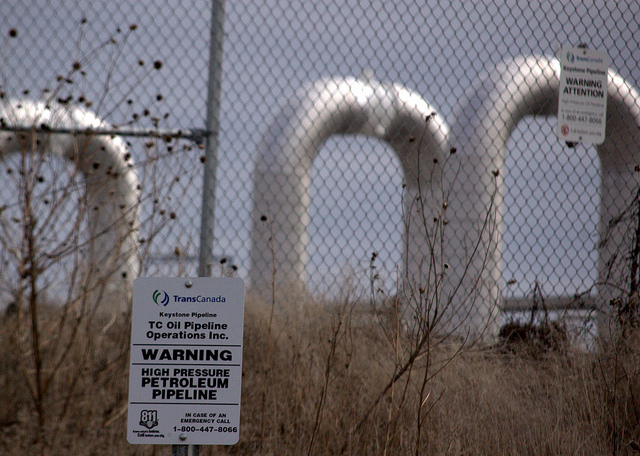Canadian pipeline company TransCanada announced today it will no longer be proceeding with its proposed Energy East Pipeline and Eastern Mainline projects.
“After careful review of changed circumstances, we will be informing the National Energy Board that we will no longer be proceeding with our Energy East and Eastern Mainline applications,” said president and CEO Russ Girling in a statement released Thursday morning.
The $15.7 billion Energy East pipeline planned to transport 1.1 million barrels of oil per day from western Canada’s oilsands to refineries in Quebec and Saint John, New Brunswick, as well as an export terminal in New Brunswick.
In late August, the National Energy Board — an independent regulatory agency that oversees international and inter-provincial oil and gas pipelines — announced it would consider upstream and downstream greenhouse gas emissions in determining whether the Energy East pipeline was in the national interest. This marked a first for the board, which had come under fire for not considering climate impacts in other pipeline hearings.
Both Enbridge’s Northern Gateway pipeline and Kinder Morgan’s Trans Mountain pipeline received regulatory approval with no consideration of their impacts on greenhouse gas emissions.
TransCanada asked the National Energy Board to put its regulatory review hearings on hold while it reviewed the decision to include an assessment of the pipeline’s impact on greenhouse gas emissions.
The decision to abandon the project comes amid low oil prices and an expected slow-down in oilsands production. Several international companies have sold off oilsands projects in the past year.
“The reason that Shell, Total and Statoil are pulling out, and the reason that Exxon has had to write down much of its Kearl Lake reserves, isn’t because of the emissions profile of the oilsands bitumen,” Jeff Rubin, senior fellow of Centre for International Governance Innovation, told DeSmog Canada in March. “It’s rather because it doesn’t make any economic sense, before we even look at emissions pricing.”
TransCanada Cancels Energy East Oilsands Pipeline. What now? https://t.co/eiNT24HaC9 #EnergyEast #cdnpoli #oilsands #climate pic.twitter.com/alGcqImBXb
— DeSmog Canada (@DeSmogCanada) October 5, 2017
In November 2015, the Alberta government announced its climate plan, which gained support from a wide range of environmentalists and the CEOs of Suncor, Canadian Natural Resource Ltd. (CNRL), Shell and Cenovus.
The plan caps oilsands emissions at 100 megatonnes per year. Environment Canada figures predicted a 2020 output of 103 megatonnes from the sector, so for production to expand beyond current projects, per barrel emissions will need to be reduced.
Pipelines have become a symbol of the larger debate about climate change, with new pipeline proposals threatening to enable increased oil production at a time when scientists and world leaders agree rapid de-carbonization is needed.
New polling released by Abacus Data in September indicates a majority of Canadians (59 per cent) are growing “more worried about climate change and it is changing my view of how long we should use oil.” That includes 48 per cent of Albertans and 35 per cent of Conservative voters.
“Energy, pipeline and climate issues have been among the most highly charged political debates in Canada for several years,” said Abacus chairman Bruce Anderson.
“What we are seeing in our numbers now is an evolution of opinion: concerns about climate change have deepened, and belief that the world is going to transition away from oil has grown.”
Three pipelines are still in the running: the Trans Mountain pipeline to the B.C. coast, the Keystone XL pipeline to the Gulf coast and Enbridge’s Line 3 export line to the U.S. All of these pipelines have received regulatory approval in Canada — but hurdles still remain.
Alberta Premier Rachel Notley said Thursday that now Energy East is dead, there is an even greater urgency in completing the Trans Mountain project to B.C. to diversify the industry’s export markets beyond the United States.
The B.C. government doesn’t share her view, however, and is currently part of a court challenge against Trans Mountain being heard this week.
The Canadian Energy Pipeline Association and others blamed TransCanada’s decision on Ottawa’s “unclear decision-making process.”
However, New Brunswick Premier Brian Gallant told the Globe and Mail he received assurances from Ottawa that the greenhouse gas assessment didn’t represent an insurmountable hurdle for TransCanada.
“Given the positive signals the federal government has sent to TransCanada over the last weeks … we believe it is clear that TransCanada is not proceeding with its application for the Energy East pipeline because recent changes to world market conditions and the price of oil have negatively impacted the viability of the project,” Gallant said.
TransCanada had hit regulatory hurdles even before the greenhouse gas assessment was announced. In the summer of 2016, the National Energy Board’s review of Energy East was compromised after it was revealed by the National Observer that former Quebec Premier Jean Charest met the chairman and two commissioners on the National Energy Board while working for TransCanada.
The National Energy Board ended up suspending the hearings into the proposed 4,500-kilometre pipeline and selecting a new panel.
TransCanada is expected to take an estimated $1-billion charge on its pre-tax fourth-quarter earnings due to Thursday’s announcement.
Photo: shannonpatrick17 via Flickr
Subscribe to our newsletter
Stay up to date with DeSmog news and alerts







